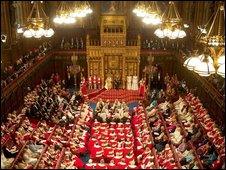Peers with London property claimed overnight allowance
- Published

Peers do not get salaries but are entitled to various allowances
More than 150 peers have been claiming a £174 tax-free overnight allowance for staying in London, despite owning a property there, a report says.
The detail is published in a report on implementing changes to the Lords expenses system.
It says 326 members who replied to a survey claim the "overnight subsistence allowance".
Of those 167 own accommodation in London and 113 own their properties outright - making them mortgage-free.
None of the peers were breaking the rules, which until recently did not specify which property was a "main home".
The findings come as the government has outlined plans to pay peers a flat rate of £300 a day to attend the House of Lords.
The regime, due to take effect in October, compares with a current maximum daily limit of £334.
Under the plans, backed by Labour, the subsistence payment of £174 a night for peers living outside London would be abolished.
The changes follow several scandals involving claims made for this allowance.
Peers living outside London were entitled to cover the cost of staying away from their main home while working, but no definition of a "main home" was supplied in the rules.
'Transparent'
In future peers would need to complete a full day's work to claim the new attendance money.
The government is proposing that a lower payment limit of £150 would apply to those who work for only part of the day.
House of Lords leader Lord Strathclyde said: "Axing through the complex current structure of allowances would represent radical change. But I believe that would be right.
"It would be cheaper to run, less bureaucratic to comply with, simpler to police and far, far harder to abuse.
"We would sweep away the controversial rules on so-called 'second homes', which in my judgement have no logic in a House that is not elected. There will be no more addresses of convenience, no more juggling of utility bills and claims forms.
"If you come to Westminster and work in Parliament, you will be able to claim the allowance. If you do not, you will not."
He added: "The existing expenses regime is discredited. It lacks credibility and the public has no confidence in it. This new plan means the end of the second homes fiasco.
"It means the end of the old expenses regime. It means a new system that is direct, transparent and accountable. It means we are making a significant step towards winning the public's confidence again."
Travel expenses
Lord Strathclyde did not explain how peers would be prevented from "clocking on", claiming a whole day's allowance for a brief appearance in Parliament.
For Labour, Lord Hunt indicated the opposition would support the proposal.
The Cabinet Office estimates that, in a typical year, the changes would reduce the maximum annual claim from about £53,000 to £45,000.
Peers' travel expenses would continue to be reimbursed separately.
The current £86.50 "day subsistence" allowance, for meals and taxis, and a £75-a-day office costs allowance, would also be covered by the new £300-a-day rate.
It is expected that peers will attend an average of 100 days out of 147, entitling them to claim about £30,000 a year.